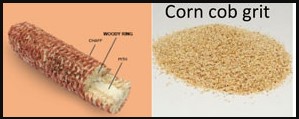By Steve Poppe
Using a grit-blaster to eradicate weeds? Why yes, indeed! Researchers with the University of Minnesota and USDA-ARS Soils Lab, Morris, will soon be using an abrasive grit to blast out weeds within rows of perennial fruit plants such as raspberries, apples, and grapes.
Weed management, particularly within rows of perennial fruit plants, is challenging. Because of the perenniality of these crops, rotation and tilling are not options. Growers might typically look to herbicides for in-row weed management. However most herbicides are not labeled for use in fruit crops. For the few herbicides labeled, there are concerns about cost, environmental effects, and efficacy of products, especially on young plantings when crops are most vulnerable to weed pressure. The other alternative is mulching. Mulching can effectively reduce weed seed germination, but once weeds begin growing, manually removing them or spot treating with herbicide is needed.
Grit weeder adapted for use in a horticultural system.
We were recently awarded funding from the Minnesota Department of Agriculture Specialty Crop Block program for a two year project focusing on controlling weeds in perennial fruit plantings by the use of decomposable grit applied via an air blast sprayer.
Grit weeding is a practice in which a soft, abrasive substrate, typically an agricultural residue such as corn cob grit, is propelled via compressed air towards weed seedlings. Grit weeders can be cheaply produced by modifying a sandblasting device to be pulled by a small tractor. Since the practice utilizes decomposable agricultural waste it may be cost-effective for these crops. Grit weeding has demonstrated effective and selective post-emergent weed control in corn, soybean, tomato and pepper without reducing yields.

One goal of this project is to determine if grit weeding in perennial fruit plantings provides effective in-row weed control. Our plan is to establish replicated plots in three locations including the WCROC, and two farmer collaborators, in order to compare grit weeding with standard grower practices. We will collect data to compare the efficacy of weed control, labor expended for each treatment, and costs of grit weeding with that traditionally employed by our cooperating growers.
Grit weeding has the potential to be an effective method of weed control for perennial fruit growers, but before grit weeding can be recommended for any system, we must investigate its effect on plant growth and development. If successful, integrating grit weeding into fruit production practices may reduce inputs while improving competitiveness for growers who rely on manual weeding for within-row management. Our project will address these important production issues to increase production and enhance sustainability of fruit crops grown in Minnesota.